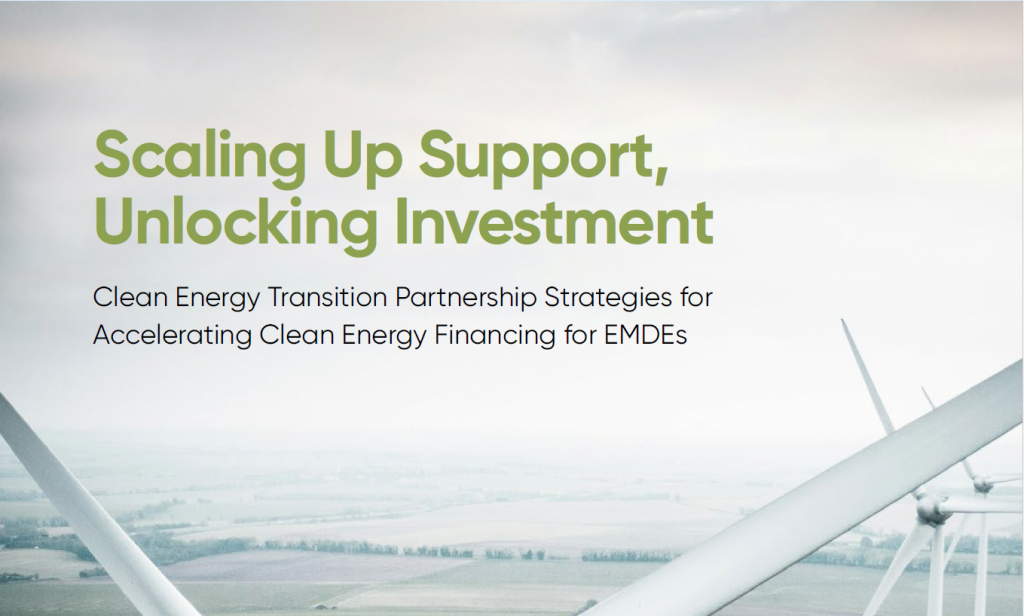Clean Energy Transition Partnership Strategies for Accelerating Clean Energy Financing for EMDEs
This independently produced report provides a snapshot of trends in CETP members’ clean energy finance, supporting the Clean Energy Action Plan work agenda. It further explores how CETP members can scale up their finance provision for clean energy, identifying potential options for enhancing the quantity and quality of that support.
CETP members provide international public financing through their development finance institutions (DFIs) and Export Credit Agencies (ECA) as well as through their contribution to Multilateral Climate Funds (MCF). The report finds that international public support for clean energy provided by CETP members has increased markedly:
- Bilateral clean energy finance by CETP members for EMDEs rose by 35% between 2018 and 2023, from an annual average of USD 3.8 billion between 2018 and 2021 to USD 5.1 billion annually in both 2022 and 2023.
- Clean energy export support mobilised by CETP members towards all countries rose by 77% between 2018 and 2023, from an annual average of USD 6.5 billion between 2018-2021 to USD 11.4 billion between 2022-2023.
These changes present a strong foundation to build on in delivering the Clean Energy Action Plan (CEAP), agreed at COP29 in Azerbaijan, over the next couple of years. The CEAP sets out actions that the CETP will collaborate on throughout 2025 and 2026 to help further increase support for clean energy. These include increasing international public support for clean energy in EMDEs, demonstrating the impact and success of the CETP, and building clean energy finance capacity within the CETP and its network.
Recommendations
The report identifies persistent challenges, such as insufficient project preparation and the prohibitive cost of capital in EMDEs (where interest payment may be 14% in Sub-Saharan Africa compared to 4% in Europe). To overcome these barriers and deliver the CEAP, the report provides key recommendations:
- Proactive Financing Strategies: Institutions providing finance should consider proactive action to identify opportunities to support the creation of a pipeline of investment-ready clean energy projects.
- Government Coherence: National governments must ensure that high-level political support for scaling up clean energy is coherent, coordinated, and clearly communicated across all government functions (ministries, DFIs, ECAs).
- Domestic Efforts in Advanced Economies: Advanced economies should accelerate scaling-up international support by developing domestic clean energy sector supply chains that can be supported by ECAs internationally, and by improving cross-government knowledge-sharing and capacity for supporting clean energy internationally.
- EMDE Enabling Environments: EMDE governments can attract greater financing by investing in domestic capacities and developing supportive policy and regulatory environments and exploring alternative financial options.
Louise Burrows, Head of Policy and Advocacy at the Global Renewables Alliance, said: “The Clean Energy Transition Partnership stands as living proof that when governments act together, transformation follows. Since its launch, signatories have cut international public finance for fossil fuels by nearly 80%, a shift worth over USD 16 billion. But progress in phasing out fossil finance must now be matched by ambition in scaling up international support for renewables. The private sector is watching; clear public finance signals provide the policy certainty and direction investors need to accelerate capital flows into clean energy markets.”
Matt Webb, Associate Director at E3G, said: “This report demonstrates the substantial progress that Clean Energy Transition Partnership members have made in shifting billions of dollars of public support out of fossil fuels and towards clean energy. Its recommendations provide a strong basis for accelerating this shift, particularly with respect to Emerging Markets and Developing Economies”
Sam Pickard and Prashant Vaze, Independent Consultants and co-authors of the report, said: “The CETP’s Clean Energy Action Plan is a great opportunity to build on the momentum created by having established a strong and willing coalition. As this report shows, more support is clearly required to reach climate targets, but the good news for cash-strapped governments is that accelerating the transition means going beyond just providing more finance: there are numerous other actions CETP members can take domestically and internationally that would multiply the impact of existing and future public support for clean energy.”

